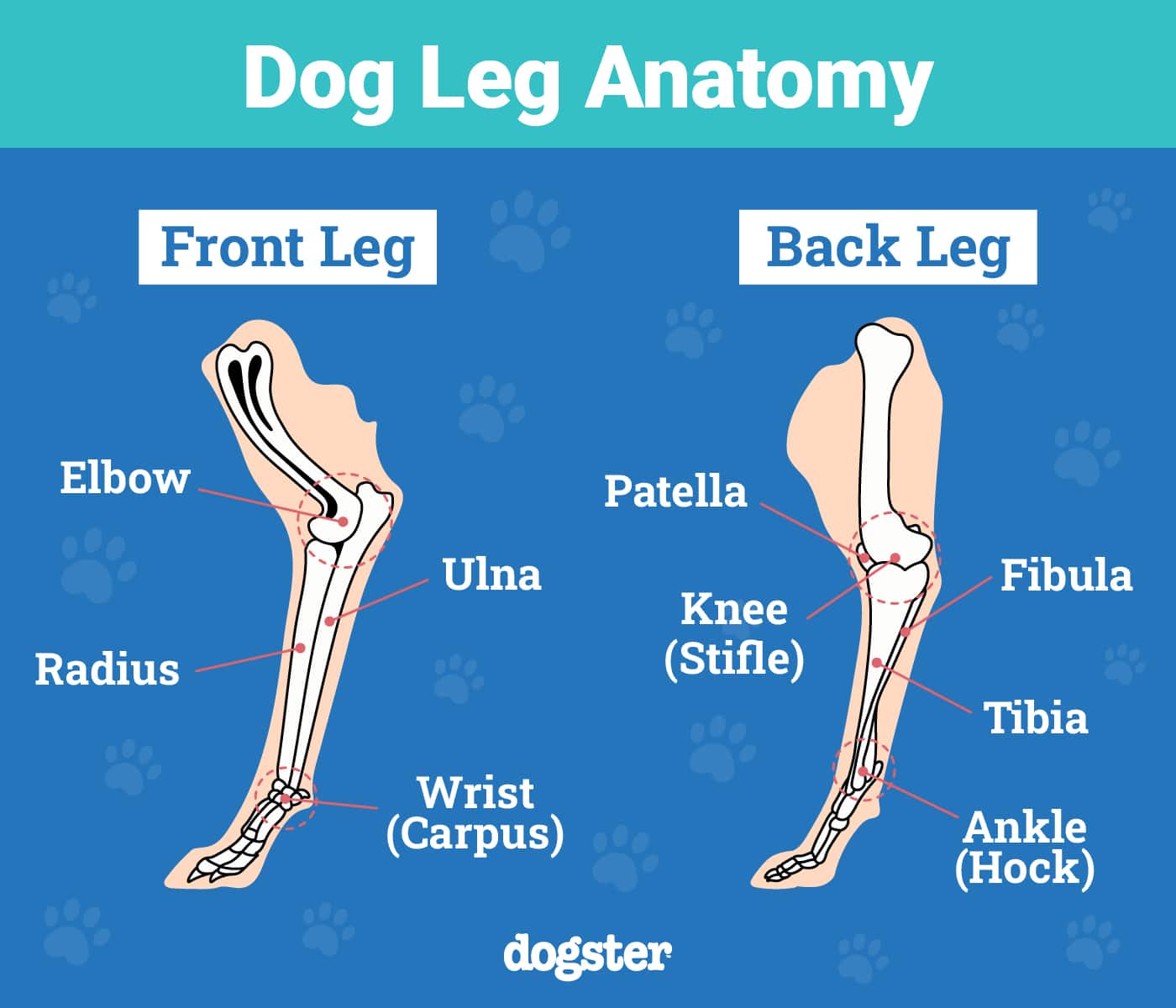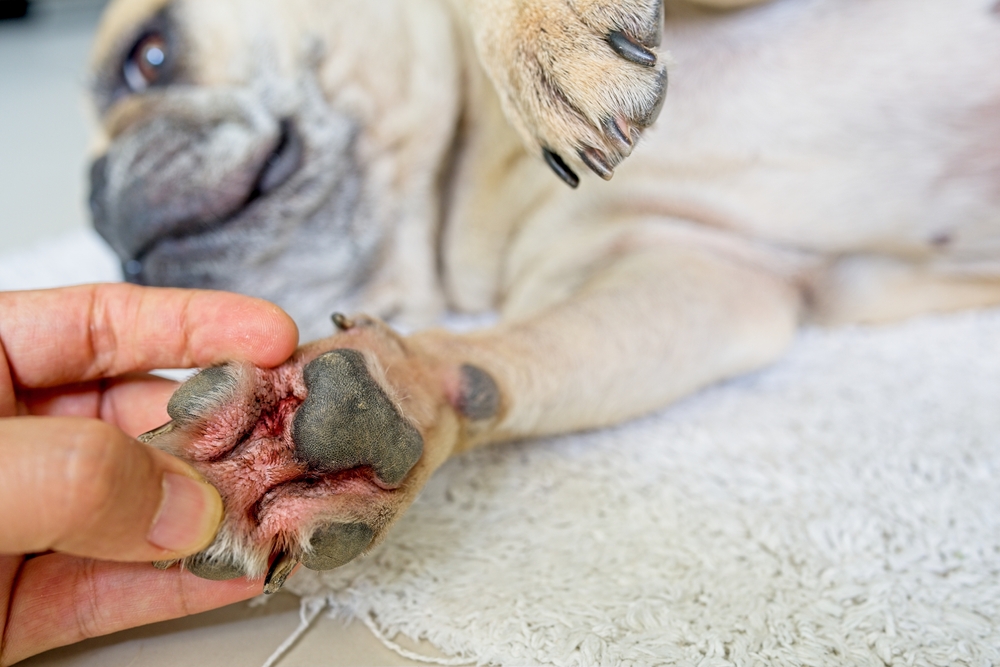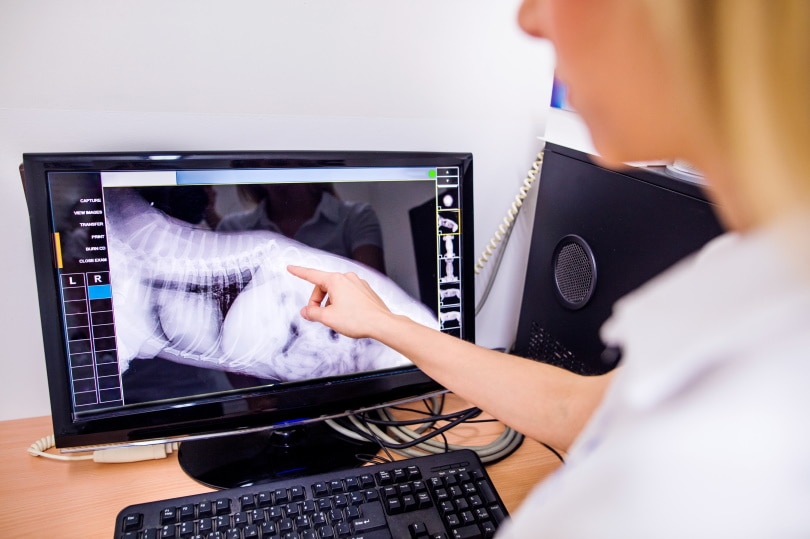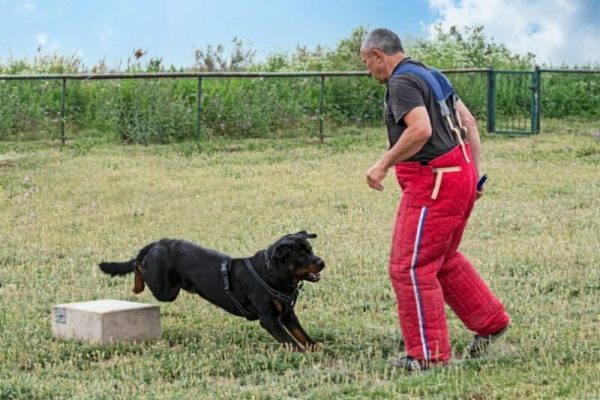In this article
If your normally active dog slows down and starts favoring one leg, it’s natural for you to worry. Limping and lameness are non-specific signs of pain in dogs, and narrowing down the reason for the problem can be complicated. Here are seven possible causes for why your dog is limping and what to do if you notice this sign.

The 7 Reasons Your Dog May Be Limping
1. Soft Tissue Pain or Injury
One possible cause of your dog’s limping is soft tissue pain or injury. Muscle strains or sprains can make your dog lame, as could a bruise or contusion. Tendon or muscle inflammation is another type of soft tissue pain.
Dogs can develop soft tissue injuries from overuse, a common occurrence in working or sporting animals. They can also happen suddenly, from a fall to an awkward landing when jumping for a ball. Your dog could also be injured from an insect bite or bee sting.

2. Spinal Issues or Nerve Pain
Dogs can also limp due to spine or nerve pain. Front leg limping could be related to cervical or thoracic spinal problems. Hind limb lameness can be due to spinal issues in the sacral, lumbar, thorax, or cervical spinal area.
Typically, dogs who limp due to spinal problems also show signs such as knuckling or dragging their feet due to impaired proprioception. If they are in pain, they might hunch over or refuse to move. Spinal conditions such as intervertebral disk disease can get severe enough that your dog isn’t able to walk at all. If this happens, it’s an emergency, and you should seek veterinary care immediately.
3. Bone Injury or Disease
Broken bones are one of the most extreme and painful causes of limping. Fractures typically occur as the result of trauma, but they can also happen secondary to bone cancer. Fractures can be obvious or subtle, such as hairline fractures.
Dogs can also limp due to other bone injuries or diseases. For example, bone bruises can make your dog limp. Dogs can also develop inflammation, cancer, infection, or degenerative changes in their bones that cause them to limp. Panosteitis, osteomyelitis, osteosarcoma, osteochondritis dissecans, hip dysplasia, femoral head necrosis, and elbow dysplasia are a few of these conditions.

4. Joint Pain or Injury
Joint pain, whether caused by an injury, arthritis, or an inherited condition, is a common reason your dog might be limping. Knee injuries, such as a cruciate ligament tear, are frequent occurrences and often require surgery to correct. Inherited joint conditions such as hip or elbow dysplasia and luxating patella can also cause lameness.
If you’re considering buying a puppy prone to one of these conditions, it’s vital to research breeders carefully. Breeding dogs should also be screened for inherited joint conditions. Dogs can develop degenerative joint diseases like arthritis as they age.
5. Foot or Paw Injury
Torn toenails or injured paw pads can result from your dog playing or running on rough surfaces. Dogs can also step on thorns, broken glass, or other sharp items.
Dogs can also fracture or sprain their toes and feet. Many paw injuries are easily visible by a quick inspection, and if you spot your dog limping, start by checking their feet.

6. Infectious Disease
Some infectious diseases, particularly those carried by ticks, can cause your dog to limp. Lyme disease and Rocky Mountain Spotted Fever, for example, both cause swollen, painful joints. These infectious diseases also cause other signs, such as fever, loss of appetite, and vomiting.
Keep your dog on a regular flea and tick preventative to help avoid this cause of limping. Ask a vet if you should vaccinate your dog against Lyme disease if it’s highly prevalent in your area.
7. Cancer
Unfortunately, another cause of limping in dogs is bone cancer and tumors. Some large dog breeds, such as Golden Retrievers and Rottweilers, are prone to a common bone tumor, osteosarcoma.
You may notice swelling on your dog’s leg in addition to limping. In some cases, your dog may suffer a fracture at the site of the diseased bone. Bone cancer can usually be seen on an X-ray.
Biopsies or an aspirate of the site may be required to diagnose the issue. A vet can talk to you about your options for treatment if it turns out your dog’s limping is due to cancer.


What to Do if Your Dog Is Limping
If your dog is limping, check the impacted limb and foot for any signs of bleeding, trauma, broken nails, or other injuries. Should you find anything concerning, contact a veterinarian.
While limping doesn’t always require an immediate trip to the vet, if you notice any of the following signs, seek care for your pet urgently:
- Broken leg (visible bones poking through the skin, leg held at a strange angle)
- Severe swelling
- Dog vocalizing in pain
- Limping with a fever
- Leg feels hot
Contact a Vet for Help
Mild lameness can sometimes heal with rest, but you should still contact a vet for recommendations on how to manage your dog. Typically, you’ll want to keep your dog confined to a small room or crate and limit running, jumping, or going up and down the stairs. A vet will provide pain medications, but ensure your dog continues to eat, drink, urinate, and defecate normally.
Did you know you can speak to a veterinarian without having to travel? Just head over to PangoVet. It's an online service where you can talk to a vet online and get the advice you need for your pet — all at an affordable price!

Modify Your Home
You may have to make a few adjustments to make it easier for your dog to move around your home. Since injured dogs should not walk on stairs, you can barricade the staircases with baby gates. To give your dog more walking space, you can move furniture or store some of it in the garage.
You can also purchase ramps so that your dog can easily access the couch or a favorite chair. However, it’s best to keep your dog from climbing a ramp to your bed or another piece of tall furniture. A short fall can cause another injury and extend the recovery process.

Ask Your Family for Help
It’s vital to teach everyone in your house how to help your dog recover. You can ask your family to avoid playing music and the television too loud, and be careful when handling your you’re your dog needs to relax in a quiet environment, and significantly minimizing their stress will help. If you have other pets, try to keep them away from your injured pup.
Depending on the severity of the injury, you and your family may have to carry your dog outside to use the bathroom. Your dog may also need to visit the vet more often to see how the recovery is progressing, and you must establish a schedule to ensure someone can also take your dog to the appointment.
If the limping doesn’t improve in a day or two or worsens, your pet may need X-rays, pain medications, surgery, or other treatments to heal.

Conclusion
No dog owner wants their pet to be in pain, and watching your dog limp can be heartbreaking. These seven possible causes for limping range from mild to cancerous, so it can be challenging to know how worried you should be. However, it’s best to have your dog checked by a vet even if the limping seems mild and starts to improve on its own.
Featured Image Credit: Phillip van Zyl, Shutterstock


















